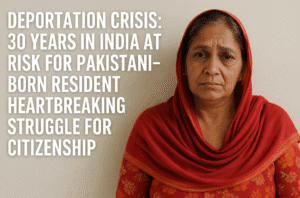Deportation Crisis: 30 Years in India at Risk for Pakistani-Born Resident – Heartbreaking Struggle for Citizenship
Sarada Bai, a 55-year-old woman born in Pakistan, has lived in Odisha for over 30 years, building a life with her Indian husband and children. Despite holding an Aadhaar card and voter ID, she is caught in legal limbo due to delays in her Indian citizenship application. Recently, she was issued an exit notice by local authorities, along with others, as part of a government crackdown on Pakistani nationals. Her family, all Indian citizens, now faces an impossible choice—separation or forced departure.
Sarada’s case underscores the failure of bureaucratic systems to address long-standing issues of citizenship for foreign nationals. Critics argue the process is not only flawed but inhumane, as it threatens to tear families apart. The case raises pressing concerns about India’s ability to balance security with empathy for its long-term residents.

Deportation Crisis: 30 Years in India at Risk for Pakistani-Born Resident – Heartbreaking Struggle for Citizenship
For over three decades, 55-year-old Sarada Bai (born Sarada Kukreja) has called Odisha home. Married to an Indian businessman, raised two children, and now a grandmother, her roots in Bolangir run deep. Yet, a recent exit notice from local police threatens to upend her life, underscoring the precarious plight of long-term residents entangled in bureaucratic and geopolitical crossfires.
From Sukkur to Odisha: A Journey of Survival
Born in Pakistan’s Sindh province in 1970, Sarada arrived in India in 1987 with her father and siblings on a 60-day visa. Settling in Koraput, she later married an Indian citizen, severing ties with Pakistan entirely. “I’ve never even spoken to anyone there,” she insists. Today, her Pakistani passport—the sole link to her birthplace—has become a liability.
Citizenship Quest Stalled, Identity in Question
Despite applying for Indian citizenship years ago, Sarada remains in legal limbo. Her case highlights systemic delays in processing citizenship requests, particularly for Pakistani spouses of Indians. While she holds a Voter ID and Aadhaar card—documents typically requiring proof of residency—their validity remains murky without formal citizenship. Local authorities have not clarified how she obtained these documents, raising questions about oversight in documentation processes.
Government Crackdown: A Wider Pattern
Sarada is among 12 Pakistani nationals in Odisha recently issued exit orders under India’s visa revocation policy. While some resided on expired visas, others, like Sarada, lacked long-term visas (LTVs) altogether. Bolangir SP’s notice warns of legal action if she fails to depart, reflecting a broader post-2019 trend of tightening regulations for Pakistani nationals, often linked to national security concerns.
“My Family Is Here”: A Plea Against Separation
“I have no one in Pakistan,” Sarada appeals, her voice breaking. Her children and grandchildren, all Indian citizens, face an impossible choice: split their family or leave their homeland. Her predicament mirrors countless others caught between rigid policies and human realities. Critics argue such cases demand a balance between security and compassion, urging streamlined citizenship processes to prevent family fractures.
The Bigger Picture: Bureaucracy vs. Humanity
Sarada’s story exposes gaps in India’s citizenship framework. While the government mandates stricter border controls post-terror threats (like the recent Pahalgam attack), delays in resolving long-pending applications leave families in perpetual uncertainty. Legal experts stress the need for transparency: either expedite citizenship grants or clarify grounds for rejection to avoid humanitarian crises.
What Lies Ahead?
As Sarada contests her notice, her fight underscores a universal struggle—for belonging, stability, and the right to stay with loved ones. With geopolitical tensions shaping individual destinies, her case tests India’s ability to harmonize security imperatives with empathy. For now, she clings to hope: “India is my country. I won’t go back.”
Why This Matters
Sarada’s ordeal is more than a legal battle; it’s a reflection of how immigration policies impact human lives. While nations prioritize security, stories like hers remind us of the urgent need for efficient, humane systems to address long-term residents’ status—before families are torn apart by paperwork.
You must be logged in to post a comment.